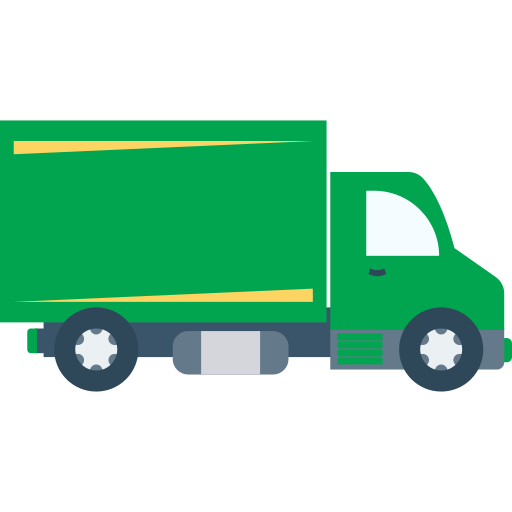Protect Your Truck/Pickup, Drive with Assurance
-
Save up to 70%
Unlock Savings of Up to 70%!
-
Minimal Documentation
Hassle-Free Coverage with Minimal Documentation
-
Simple Process
Proctect your truck in few minutes
What is Truck Insurance?
Truck insurance is a specialized form of coverage designed to protect trucks, truck drivers, and the businesses involved in the transportation of goods or services. Since trucks are often used for commercial purposes, they face unique risks that require tailored insurance solutions. From accidents and theft to damage and liability, truck insurance ensures that your vehicle and business are protected from unexpected financial losses.
In many countries, including India, truck insurance is mandatory for all commercial vehicles under the Motor Vehicles Act. Having valid insurance helps mitigate risks and ensures that truck owners and operators comply with legal requirements while minimizing financial exposure.
Benefits of Truck Insurance
Truck insurance is essential for individuals and businesses involved in transportation and logistics. It provides protection against a variety of risks and ensures the smooth operation of your business. Here are the key benefits of truck insurance:
- Business Continuity: In case of accidents or other incidents, truck insurance helps minimize downtime by covering repair or replacement costs. This ensures that your business operations are not significantly disrupted, helping you maintain consistent revenue.
- Legal Compliance: Truck insurance is mandatory for all commercial vehicles under the Motor Vehicles Act in many countries, including India. Having a valid insurance policy ensures compliance with legal requirements and avoids penalties, fines, or impounding of your vehicle.
- No Claim Bonus (NCB): No Claim Bonus (NCB) in truck insurance is a benefit awarded to policyholders for not making any claims during the policy term. It acts as a reward for responsible ownership and safe driving practices, offering a discount on the renewal premium. NCB is a key feature of truck insurance that helps reduce costs over time.
What Types of Trucks are Covered in Truck Insurance?
Truck insurance policies can be tailored to cover various types of trucks, depending on their purpose, size, and usage. When purchasing truck insurance online, you can insure different types of trucks, including:
Mini trucks
Mini trucks are among the smallest types of trucks available. They are commonly used for commercial purposes, hyperlocal deliveries, and local pickups.
Light trucks
Light trucks are commonly used for transporting goods between cities. Many e-commerce businesses today rely on light trucks for their daily logistics and transportation needs.
Medium trucks
Medium trucks, as the name implies, are larger than regular pickup trucks. These trucks are commonly used for transporting bulkier items such as furniture, waste, and other large goods.
Heavy Truck
It is the largest type of truck, primarily used for carrying building materials and towing heavy loads
What is Covered under Truck Insurance?
Truck insurance provides comprehensive protection to safeguard your vehicle, business, and financial stability against a wide range of risks. Below are the key coverages offered under a typical truck insurance policy:
Theft Protection
Truck insurance covers the loss or theft of your vehicle. The insurer compensates you based on the insured declared value (IDV) of your truck.
Personal Accident Cover
This provides financial compensation for medical expenses, permanent disability, or death of the owner-driver in the event of an accident involving the insured truck.
Third-Party Liability
Mandatory under the law, this coverage protects you from legal and financial liabilities arising from: Damage to third-party property, Injuries or death of a third party caused by your truck.
Towing Assistance
Covers the cost of towing the truck to the nearest repair center after a breakdown or accident.
Accident Damage
Covers the cost of repairing or replacing your truck if it is damaged in a road accident, regardless of whether it was a collision with another vehicle, an object, or caused by a skid or overturn.
Fire
Fire protection is a crucial component of truck insurance that safeguards your vehicle from damages caused by fire
What’s Not Covered under Truck Insurance?
While truck insurance provides extensive protection, there are certain exclusions that are not typically covered by standard policies. It's important to understand these exclusions to avoid surprises during claims. Here are the common scenarios not covered under most truck insurance policies:
-
Damage Due to Driver Negligence:
If the driver is under the influence of alcohol or drugs at the time of an accident, the insurance will not cover the damages. Damages resulting from rash driving, such as excessive speeding or ignoring traffic laws, are usually excluded.
-
Driving Without a Valid License:
If the driver of the truck does not have a valid driving license, the insurance company may reject any claims arising from an accident.
-
Contributory negligence:
Contributory negligence refers to situations where the owner-driver's actions or failure to take proper precautions contribute to the damage or accident. In such cases, the insurance may reduce or deny the claim based on the extent of the negligence. Here’s how contributory negligence can affect truck insurance.
-
Consequential Damages:
Any damage that is not a direct outcome of the accident (e.g., if the truck, after being damaged in an accident, is improperly used and the engine gets further damaged, it will not be cover.
-
War and Nuclear Risks:
Damage caused due to poor maintenance or neglecting regular vehicle servicing (e.g., failure to replace worn-out brakes or tires) may not be covered. Insurance generally doesn’t cover damages resulting from lack of care or maintenance.
What Extra Coverage Options Can Be Added to Truck Insurance?
Truck insurance can be customized with several add-on covers to enhance protection. Here are some common add-ons available under truck insurance:
-
Zero Depreciation Cover
This add-on ensures that you receive the full claim amount for the repair or replacement of damaged parts without depreciation being deducted. It's particularly useful for new trucks.
-
Engine and Gearbox Protection
This add-on provides coverage for the cargo being transported in the truck, protecting it from damage or theft during transit.
-
Goods in Transit Coverage
The No Claim Bonus (NCB) is an add-on benefit available with pickup insurance that rewards policyholders for making no claims during the policy year. If you don't file a claim during the policy period, you are eligible for a discount on the premium for the next policy renewal.
-
Roadside Assistance
This provides support in case of breakdowns, offering services such as tire changes, fuel delivery, and mechanical assistance to help get your truck back on the road quickly.
-
Loss of Income Protection
This add-on covers the loss of income due to business disruption caused by the truck being out of service after an accident.
Factors Affecting Truck Insurance Premiums?
The premium for truck insurance is determined by several factors that assess the level of risk associated with insuring a truck. Here are the key factors that influence the truck insurance premium:
-
Type of Truck:
The size, model, and usage of the truck play a major role in determining the premium. For example, larger, heavier trucks or trucks used for long-distance travel typically have higher premiums compared to smaller, local delivery trucks.
-
Age of the Truck:
Older trucks tend to have higher premiums because they are more prone to breakdowns and accidents, and the cost of repairs is generally higher. Newer trucks, on the other hand, are less risky to insure, leading to lower premiums.
-
Purpose of the Truck:
The use of the truck affects the insurance cost. Trucks used for commercial purposes, such as transporting goods over long distances or carrying hazardous materials, generally attract higher premiums compared to those used for personal or local purposes.
-
Geographical Location:
The area in which the truck operates can affect the premium. Trucks operating in areas with higher accident rates, theft risks, or exposure to extreme weather conditions may have higher premiums.
-
Coverage Type:
The level of coverage you choose also affects the premium. Comprehensive policies that cover a wide range of risks, including damage, theft, and natural calamities, tend to have higher premiums than basic third-party liability policies.
-
Claim History:
A truck's claim history can also impact the premium. If the truck has been involved in multiple claims in the past, the insurer may raise the premium to account for the higher risk.
-
Engine Capacity:
The engine capacity of the truck affects the premium as well. Trucks with higher engine capacity (more powerful engines) are typically seen as riskier to insure due to their potential to cause more damage in case of an accident.
Required Documents for Filing a Truck Insurance Claim
When filing a truck insurance claim, it’s important to have all the necessary documents to ensure a smooth and timely process. Here’s a list of documents typically required:
- Claim Form
- Vehicle Registration Certificate (RC)
- FIR/Police Report
- Repair Estimates
- Vehicle Keys (theft or loss)
FAQ's
Truck insurance typically covers damages caused to third parties, including injuries, property damage, and legal expenses. Some policies may also cover damage to your own truck, theft, or natural calamities, depending on the coverage type.
Yes, if you have a comprehensive truck insurance policy, it will cover damages caused to your truck in the event of an accident. A third-party policy will only cover the damages caused to others in the accident, not your own truck.
Truck insurance premiums are determined based on several factors, including the type of truck, its age, engine capacity, usage, driver history, and coverage level.
No, the option to pay for commercial vehicle insurance premiums in installments is not available. According to Section 63VB of The Insurance Act, 1938, insurance companies are required to collect the full premium in advance.
If you decide to sell your truck, you can transfer the commercial truck insurance policy to the new owner. However, the No Claim Bonus (NCB) cannot be transferred to the new owner, as it is linked to the policyholder's claim history, not the vehicle itself.
In the event of an accident, contact your insurance provider immediately to file a claim. Ensure that you have all necessary documents like the police report, damage photographs, and repair estimates to support your claim.
Yes, you can get a cashless claim for your damaged truck if your insurance policy includes a cashless facility and if you get the repairs done at a network garage approved by your insurer. The insurer will directly settle the repair costs with the garage, and you won’t need to pay out of pocket, except for any deductibles or additional charges not covered by the policy.
If you forget to renew your truck insurance, your coverage will lapse, and you won't be protected against accidents, theft, or other damages. Additionally, you may face penalties if caught driving without valid insurance. To avoid this, it's important to renew your policy before it expires.
Mini trucks, light trucks, medium trucks, and heavy trucks can all be covered under a truck insurance policy.
Yes, you may be eligible for a refund of your truck insurance premium if you cancel the policy, provided that no claims have been filed during the coverage period. The refund amount will depend on the insurer's terms and the time left on the policy.



